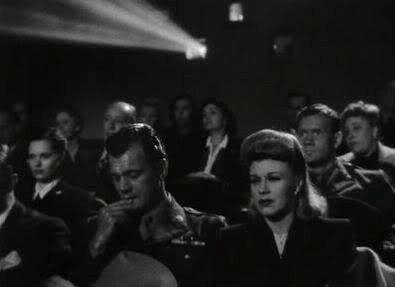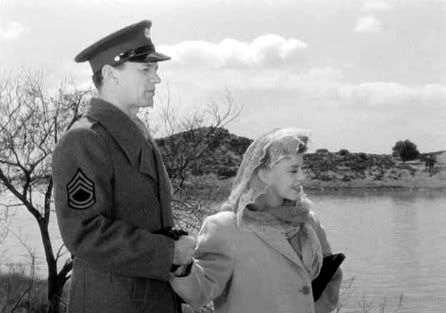watched it again today and must admit it keeps getting better. I put it
right up there with The Best Years of Our Lives, Until They Sail and
Till the End of Time, and ahead of Since You Went Away.
Directed by William Dieterle and produced by Dore Schary [/b
(executive produced by David O. Selznick the same year as his
Since You Went Away), this movie has only superficial elements in
common with Selznick's more famous homefront saga, including the
casting of teenage Shirley Temple. It's a much darker, more disturbing
film and doesn't feel it is working any propaganda angle. In fact, it's
quite ambivalent, almost noirish in the character's projections of
fear and the way scenes proceed from dark, to gradual brightening of
prospects, back to clouds dimming the light and eventual storms rolling
in. Each time things seem to be going somewhat smoothly a disturbing
note will sound (making use of the classic standard "I'll Be Seeing You"
written by Sammy Fain and Irving Kahal is not just commercially sound,
it's actually a fitting choice because the tune is bittersweet, about loss and
wishfully seeing something that is no longer there: the hopes and dreams
of the two leads, for instance).
Ginger Rogers and Joseph Cotten play two of the most
damaged romantic couples outside the world of film noir and I have
to wonder if some in the audience when this movie was released found it
a bit of a downer during a time when escapism was wanted and needed?
She's an inmate of the State Penn convicted of manslaughter on a
Christmas "break" (due to good behavior) to visit her Aunt (Fay Bainter)
and Uncle (Tom Tully), who meets a soldier (Cotten) on the train who
turns out to be recovering from a crippling case of shell shock and has no
family or home. Both stars play their parts to perfection and without
histrionics or affectation of being above their own particular fears. It's one
of Ginger's most moving and likable characters and one of the few times
she really allows herself to be vulnerable. Cotten, is of course a pro at
playing troubled men and this is my favorite performance by him, along
with "Uncle Charlie" from Shadow of a Doubt. He is pitifiul and
pathetic, but seems so genuinely hurt and struggling to overcome it
that it never descends into a pity party.
Both characters hide their circumstances from the other, fearing to put
them off---and we see by extension how their wider circle of
acquaintances (Ginger's family, including slightly spoiled and nosy niece,
Shirley Temple, her former friends and even some local political
big wigs) alternately try to avoid confronting the truth or make too much
of it. One scene with the politicos querying Cotten as to the political
stance of the "average soldier" is one of the most ambivalent scenes on
the subject I've ever seen in a movie of this period. You think it's setting
up for some old fashioned boosterism and it turns out anything but. In
many ways, I'll Be Seeing You feels like a movie made several
years later with it's damp, almost pessimistic tone.
The way the film is photographed contributes the ambivalent and
disturbing mood because the lighting---at least on the print I watched---is
at a muted key, lacking any really strong contrasts but often light is either
dappled, filtered, or shaded "grey" in tone. There is no high key "gloss"
as in SYWA, but rather a misty and subdued appearance throughout. In
fact, whithout giving away the content of the final scene, I will just say
that it is shot in true film noir, expressionistic style that provides a
somber, contrasting atmosphere for the actions of the characters.
I hope TCM will air the movie again soon and that more people will
discover this unsettling and creative look at the lives of two people in
smalltown, WWII U.S.A.
Two "dates" that take on unsettling turns:
Cotten and Ginger Rogers go to the movies---a war movie. The battle
scenes discomfit Cotten and discussing it afterward, he remarks on how
different the soldier's experience of battle is to how the movies always
portray it.

A walk by a lake that starts pleasantly will lead to the State
Line---where Ginger knows she may not cross or risk the penal
consequences. Nothing is ever unalloyed bliss for either lover.

